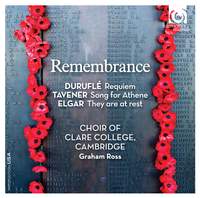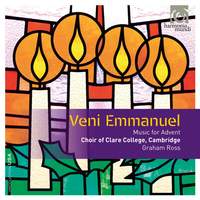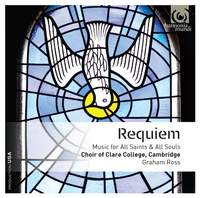Interview,
Graham Ross on 'Remembrance'
 The choir of Clare College, Cambridge, have for some years been growing in prominence and popularity among classical music lovers, with a series of highly-regarded recordings that showcase the choir's distinctive sound (one of the first Cambridge colleges to admit women, Clare has long had a mixed choir, which contrasts sharply with the male-only sounds of King's and John's).
The choir of Clare College, Cambridge, have for some years been growing in prominence and popularity among classical music lovers, with a series of highly-regarded recordings that showcase the choir's distinctive sound (one of the first Cambridge colleges to admit women, Clare has long had a mixed choir, which contrasts sharply with the male-only sounds of King's and John's).
Their latest release is a timely collection of Remembrance-themed works, ranging from the Renaissance to the ever-popular Requiem by Duruflé. I caught up with the choir's musical director Graham Ross to talk about this new album.
There are a lot of ‘Remembrance’-themed choral collections available – what made you decide to put this new one together, and what do you feel makes it different?
I had long wanted to record Maurice Duruflé’s Requiem Mass setting. In the 2015-16 academic year I had a slightly larger choir at Clare College than usual, and a first-rate Organ Scholar, Matthew Jorysz, who has since gone on to become Assistant Organist at Westminster Abbey. This combination worked particularly well for this Requiem setting, allowing for a slightly greater depth of sound in the more dramatic moments, without losing any of the delicacy of Duruflé’s textures. We recorded the Duruflé in some magical late-night sessions in Lincoln Cathedral, capturing their magnificent Father Willis organ which works so well for this repertoire.
All of my Harmonia Mundi recordings with the Choir of Clare College have featured a wide range of repertoire, often sitting two very different composers side-by-side and playing them off each other. This is in no way intended as a gimmick: it is a conscious decision to try and encourage us to listen afresh to the music and appreciate each listening as if it is the first. With any disc we can of course select particular tracks to listen to, but I also hope that it is possible to listen to each recording as a complete sequence – I spend much time planning my programmes to try and enable this. The sometimes eclectic mix of repertoire reflects what we do day in, day out in our Chapel services during the academic terms, where I programme a very wide range of repertoire to ensure that my students are exposed to as broad and extensive an education as possible, tackling music from a wide variety of styles and backgrounds. In addition to the Duruflé, this Remembrance programme offers nine a cappella settings of English texts that are all extraordinary masterpieces in their own right, recorded in the unmatched acoustic of the Lady Chapel at Ely Cathedral. When heard as a sequence, I hope that they serve as a foretaste of the Requiem which is programmed at the end of the disc, with an underlying theme of sacrifice and loss.
The Duruflé Requiem is a strong contender for the most popular work in that genre, often performed and recorded. Is there any specific performance of it that you feel has particularly influenced your own approach?
I have conducted this work many times over the last decade and in doing so each time discover something new. Listening to other performances is always an informative part of the learning process, but should only be done once you have your own clear interpretation in mind. Duruflé’s score is clearly marked up, which certainly makes the process easier, but listening to his own recording of the orchestral version was a fascinating discovery for me, not least for how he colours the music through his instrumentation, and his performance of it. Some of his own tempi are rather different from his score, however, so some executive decisions had to be taken!
Different kinds of choirs have, of course, different sounds – the sound of a young, mixed-voice college choir is a particularly unique one. Do you try to mould the choir’s sound to fit the repertoire (some of which may have been written with boys’ voices in mind, for example), or do you just allow the sound to be itself?
This is a question I’m often asked, and understandably so. Clare College was one of the first of the Cambridge Colleges to admit women, which paved the way for the creation of a mixed-voice choir, distinct from our neighbours at King’s and St John’s with their boy choristers. When prospective Choral Scholars come to audition to me they are often only 17, when their voices are very much changing (continuing to do so during their time as undergraduates). In that sense, you can’t have any pre-conception of what sound you are going to create as the voices develop over time and the collective sound changes with that. But you can certainly have an idea in mind of what sound you wish to create for each work you approach, and part of the skill in the job of a Director of Music is being able to mould the sound accordingly as befits the repertoire. There are many pros and cons to working with both boy trebles and female undergraduates, of course, but one advantage of a young mixed-voice choir is that with older more developed voices I am able to manipulate the sound and utilise the forces at my disposal accordingly: we spend much time in rehearsal adapting the sound that we create. There is ‘a Clare sound’, I believe, but this has to be very flexible: I wouldn’t wish my singers to approach a Tallis motet in the same way that they would, say, a Brahms motet. This makes for a versatile group of musicians who become hungry for a very wide range of repertoire, which allows us to offer a greater range of performances both inside and outside of our Chapel, and, ultimately, gives the students a broader education.
The 16th-century anthems on this album – the Farrant, Tomkins, Ramsey and Weelkes – are perhaps a little off the beaten track in terms of repertoire. How do you think the way composers respond to these themes of loss and sacrifice has changed between their time and Duruflé’s – and indeed our own?
It’s important to note that three of the most emotionally-intense pieces in this programme were not intended for performance in the Church. Both Tomkins’ and Weelkes’ settings of When David heard were probably written as laments for Henry, Prince of Wales and heir to the throne in Britain, who died whilst still in his teens in 1612. They concern the lament over Absalom, the third son of David, King of Israel, described by Samuel as the most handsome man in the kingdom, who rebelled against his father and was killed during the Battle of Ephraim Wood. Both works employ poignant dissonances leading to consonances, false relations, with sighing descending lines of a father weeping at the loss of his son. Their slightly younger contemporary, Robert Ramsey, was a Scottish-born composer and organist who graduated as a Bachelor of Music from the University of Cambridge in 1616. His masterpiece How are the mighty fallen? focuses on the lament over Jonathan, in which the king describes his friend as ‘my brother’. Ramsey’s sound world is far removed from the classicism of sacred liturgical music by his English contemporaries, employing some astonishingly sensuous and startlingly daring dissonances for its time.
The twentieth-century contributions in this programme offer much more meditative soundworlds, in general: William Harris’s Bring us, O Lord God reserves its most mystical passage for the concluding Amens and final cadence; Elgar’s They are at rest rarely rises above a mezzo-piano, and John Tavener’s Song for Athene is masterfully held back until an ecstatic unfolding of the voices. These moments perhaps allow more time for us to reflect on the afterlife than trying to depict the details of death itself. This is particularly apparent in the final track of our recording: Duruflé’s luminous F sharp major setting of the In Paradisum text, where the sopranos lead the departed on the path to paradise, before all voices, singing as the Chorus Angelorum, grant eternal rest.
'Remembrance' was released at the end of October on Harmonia Mundi.
Available Formats: CD, MP3, FLAC, Hi-Res FLAC
Other recent recordings by the choir of Clare College
The choir's collection of Advent music, featuring the world-premiere recording of a new work by baritone Roderick Williams alongside traditional favourites.
Available Formats: MP3, FLAC
An appropriate counterpart to 'Remembrance', this disc from 2015 explores music written for the festivals of All Souls and All Saints, from Victoria to Leighton.
Available Formats: MP3, FLAC, Hi-Res FLAC
Graham Ross conducts the choir in world-premiere recordings of works by Imogen Holst (long overshadowed by her famous father) and her colourful orchestration of Britten's 'Rejoice in the Lamb'.
Available Formats: MP3, FLAC, Hi-Res FLAC






